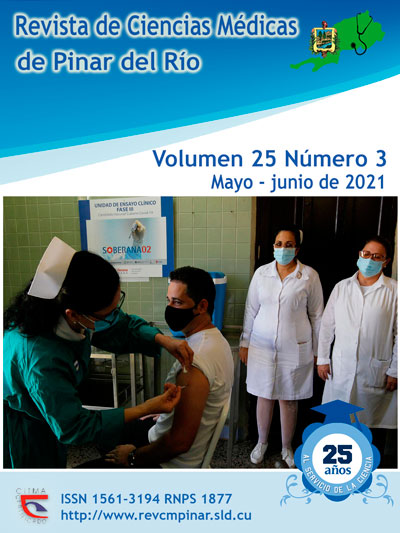Propuesta metodológica para el trabajo de la historia de la medicina de la localidad
Palabras clave:
HISTORIA DE LA MEDICINA, APRENDIZAJE, APRENDIZAJE DEL SISTEMA DE SALUD, CURRICULUM, INVESTIGACIÓN SOBRE SERVICIOS DE SALUD.Resumen
Introducción: el vínculo del contenido de aprendizaje con la práctica social constituye un enfoque importante para el trabajo con la historia local.
Objetivo: diseñar una propuesta metodológica para el trabajo de la historia de la Medicina de la localidad desde la actividad curricular.
Métodos: investigación de desarrollo con enfoque mixto durante el curso escolar 2019-2020 en la Facultad de Ciencias Médicas “Dr. Ernesto Guevara de la Serna”, Pinar del Río. Se trabajó con el universo constituido por 12 docentes. Para obtener la información se utilizó guía de observación a clases y la encuesta.
Resultados: insuficiente trabajo con la historia de la Medicina de la localidad desde los currículos educativos. En el 92,44 % de las clases observadas no fueron abordados aspectos relacionados con el desarrollo de la Medicina en la localidad, historias de vida de personalidades destacadas en sus servicios, valores humanos y participación social. Los docentes presentan carencias en los conocimientos relacionados con la historia de la Medicina de la localidad. Se diseñaron ocho acciones para el trabajo metodológico.
Conclusiones: a partir de las insuficiencias identificadas se elaboraron acciones metodológicas que fueron valoradas por especialistas como pertinentes, factibles de aplicar por la disponibilidad de recursos humanos y materiales para ejecutarlas y con calidad científico pedagógica para su implementación.
Descargas
Citas
1. Herrera Miranda GL. El trabajo metodológico del proceso docente educativo en la especialización. Revista de Ciencias Médicas de Pinar del Río [Internet]. 2015 [citado 06/04/2021]; 19(4): 712–23. Disponible en: http://www.revcmpinar.sld.cu/index.php/publicaciones/article/view/2105/html_105
2. Ramos R, Díaz AA, Valcárcel N, Ramírez BM. Las competencias profesionales específicas en la formación de los especialistas en Medicina General Integral. Educ Med Super [Internet]. 2018 [citado 10/03/2020]; 32(1): 130-140. Disponible en: http://scielo.sld.cu/scielo.php?script=sci_arttext&pid=S0864-21412018000100013
3. Páez M, Gilimas AM, Díaz T, Breijo T. El trabajo metodológico, una mirada desde los programas académicos de posgrados. Rev. Mendive [Internet].2019 Dic [citado 24/03/2021]; 17(4): 549-564. Disponible en: http://scielo.sld.cu/scielo.php?script=sci_arttext&pid=S1815-76962019000400549&lng=es
4. Mena TA, López E, Silva LR. Una nueva mirada: sistema para el trabajo metodológico en disciplinas docentes complejas. Rev. mendive[Internet].2020 [citado 22/03/2021]; 18(4): 923-939. Disponible en: http://scielo.sld.cu/scielo.php?script=sci_arttext&pid=S1815-76962020000400923&lng=es.
5. Bonilla AL. Alternativa metodológica para el conocimiento de la historia de la comunidad en las escuelas multigradas. Rev. Mendive [Internet].2020 [citado 24/03/2021]; 18 (2): 367-378. Disponible en: http://scielo.sld.cu/scielo.php?script=sci_abstract&pid=S1815-76962020000200367&lng=es&nrm=iso
6. Peña PD, Molina FB, Barrabia MO. Enseñanza de la historia de la Medicina en universidades de América Latina y España. Un estudio comparado. Cuba y Salud[Internet]. 2017 [citado 24/03/2021]; 12(2): 35-44. Disponible en: https://www.medigraphic.com/cgibin/new/resumen.cgi?IDARTICULO=72868
7. Barrea M, Hernández IM, García T. Determinantes para la enseñanza de la Historia de Cuba en el contexto de formación médica. Rev. Mendive [Internet].2019 [citado 22/04/2021]; 17(2): 183-192. Disponible en: http://scielo.sld.cu/scielo.php?script=sci_abstract&pid=S1815-76962019000200183&lng=es&nrm=iso
8. Vázquez L, Estrada R. La concepción latinoamericanista para la enseñanza de la Historia en América. Educación y Sociedad[Internet]. 2020 [citado 22/04/2021]; 18(1): 90-100. Disponible en: https://core.ac.uk/download/pdf/287219974.pdf
9. Amechazurra M, O Farril M, Santana M, Martínez E, Mena C. Acciones metodológicas para el trabajo de la historia de la enfermería en la localidad. Rev Cuba Enf [Internet].2017 [citado 24/03/2021]; 33(1): 121-123. Disponible en: https://www.medigraphic.com/cgi-bin/new/resumen.cgi?IDARTICULO=90877
10. Peña D. Estrategia pedagógica para el trabajo educativo desde la Historia de la medicina. Panorama Cuba y Salud [Internet]. 2018 [citado 22/03/2021]; 13(Especial): [aprox. 4 p.]. Disponible en: http://www.revpanorama.sld.cu/index.php/panorama/article/view/992
11. Rivero K, Hernández BL, Aguiar NM, Benítez LM. Multimedia complementaria para la enseñanza de la Historia de la Medicina en Cuba Colonial. Revista Habanera de Ciencias Médicas[Internet]. 2014 [citado 24/03/2021]; 13(3): 500-510 https://www.medigraphic.com/cgi-bin/new/resumen.cgi?IDARTICULO=50795
12. Bravo MR, Fabé I. El Proceso de Enseñanza Aprendizaje de la Historia de Cuba con el empleo de un aula virtual. Rev. Mendive [Internet].2018 [citado 2021 Mar 25]; 16 (3): 455-469. Disponible en: http://scielo.sld.cu/scielo.php?script=sci_abstract&pid=S1815-76962018000300455&lng=es&nrm=iso
Publicado
Cómo citar
Número
Sección
Licencia
Aquellos autores/as que tengan publicaciones con esta revista, aceptan los términos siguientes:- Los autores/as conservarán sus derechos de autor y garantizarán a la revista el derecho de primera publicación de su obra, el cuál estará simultáneamente sujeto a la Licencia de reconocimiento de Creative Commons que permite a terceros compartir la obra siempre que se indique su autor y su primera publicación esta revista.
- Los autores/as podrán adoptar otros acuerdos de licencia no exclusiva de distribución de la versión de la obra publicada (p. ej.: depositarla en un archivo telemático institucional o publicarla en un volumen monográfico) siempre que se indique la publicación inicial en esta revista.
- Se permite y recomienda a los autores/as difundir su obra a través de Internet (p. ej.: en archivos telemáticos institucionales o en su página web) antes y durante el proceso de envío, lo cual puede producir intercambios interesantes y aumentar las citas de la obra publicada. (Véase El efecto del acceso abierto).



